Kristin Smart murder trial: Defense attorneys question credibility of cadaver dog handlers
Three dogs trained to detect human remains reacted when searching the former residence hall room of murder defendant Paul Flores, their handlers testified Tuesday in Monterey County Superior Court.
But defense attorneys questioned the handlers’ expertise, with one lawyer dismissing them as merely “volunteers.”
Cadaver dogs, also known as human remains detection dogs, are a key piece of the prosecution’s case against Flores, who’s accused of killing Cal Poly student Kristin Smart after an off-campus party in 1996. His father, Ruben Flores, is on trial for allegedly helping hide the body.
The two were arrested in April 2021.
The trial against the Flores men moved to Salinas after San Luis Obispo Superior Court Judge Craig van Rooyen ruled the two would not likely receive a fair trial in San Luis Obispo.
Monterey County Superior Court Judge Jennifer O’Keefe is presiding over the case.
On Monday, O’Keefe acknowledged Adela Morris as an expert in human remains detection dogs in the second half of her testimony.
Morris’ two dogs, Cholla and Cirque, both alerted to Paul Flores’ dorm room and bed during a June 1996 search of the Cal Poly campus
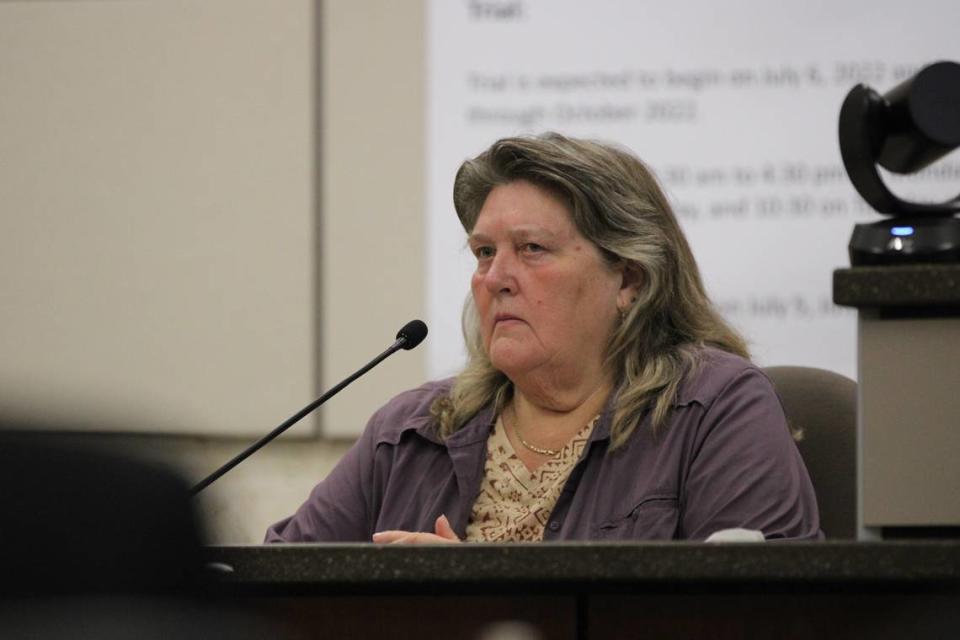
Cadaver dog alerts to Paul Flores’ dorm room
Cholla was the first of Morris’ dogs to search the dorm and alert to Flores’ dorm room in Santa Lucia Hall in the Cal Poly campus, Morris testified Monday and Tuesday.
The search was executed blindly, meaning Morris did not have information on areas of suspicion.
Cholla ran down the hallway, turned around three-quarters of the way there and became interested in three doors before alerting to room 128 — Flores’ room, Morris said on the stand.
Morris said the alert was clear and enthusiastic, with Cholla jumping up onto her hips rather than her thighs.
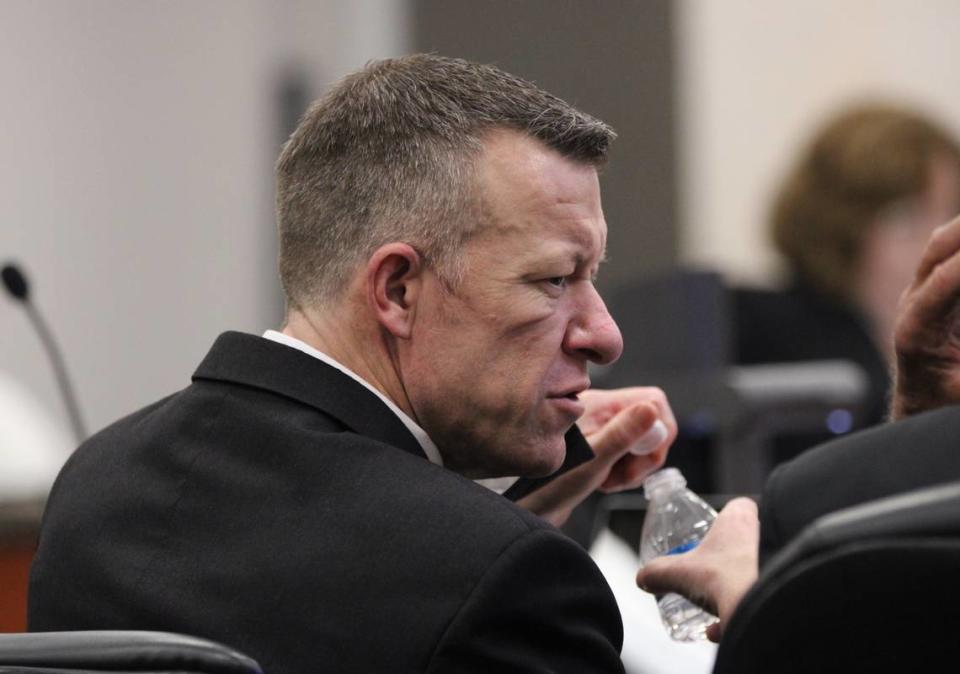
When a police officer opened the room, Cholla searched the room, focusing on the left side — Flores’ side — before alerting to the bed multiple times, Morris said.
Cholla returned to Morris’ car after searching the room, and Cirque, Morris’s other dog, was brought out, the handler said.
The search was executed the same way, with Morris standing at the end of the hall and allowing Cirque to search off-leash, Morris testified.
Cirque also alerted to Flores’ room, and when let inside alerted to the left side of the room, Morris said.
Neither Cholla or Cirque alerted to the right side of the room or any other place in Santa Lucia Hall when Morris directed the dog to search there, she said.

When San Luis Obispo County Deputy District Attorney Chris Peuvrelle asked Morris on Tuesday about the significance of bringing in Cirque to also search the dorm, she replied: “It’s why we do a blind search ... It’s going to tell a story. If it matches, it’s pretty interesting. Bringing my other dog in, it’s a way to kind of compare what I’m seeing.”
When officers asked Morris to have her dogs search a dumpster behind the dorm hall, Morris testified she told them she could do it but noted that dumpsters are highly contaminated and such a search may not be as reliable.
She said her dogs were both had a small alert at the dumpster, but it was not as clear as the one at Flores’ dorm room.
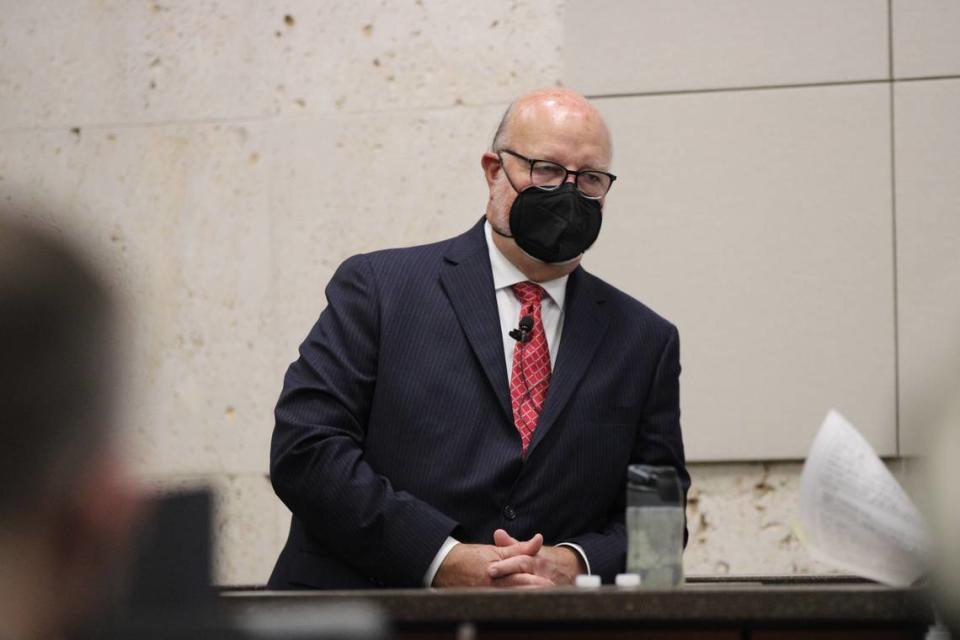
Defense questions credibility of cadaver dog handlers
Robert Sanger, Paul Flores’ attorney, and Harold Mesick, Ruben Flores’ attorney, focused on questioning both Morris’ expertise and her dogs’ reliability.
Sanger, questioning the credibility of Morris and her colleagues, pointed out several times Monday and Tuesday that dog handlers do not get paid by law enforcement agencies to help with searches.
Sanger repeatedly asked Morris in various ways if she was a “volunteer.”
“We are unpaid professionals, yes,” Morris replied to Sanger on one occasion.
“I don’t want to demean your work. You do great work at disasters and that explosion and whatnot,” Sanger replied, referring to an explosion in Nevada where Morris’ dog helped find human remains.
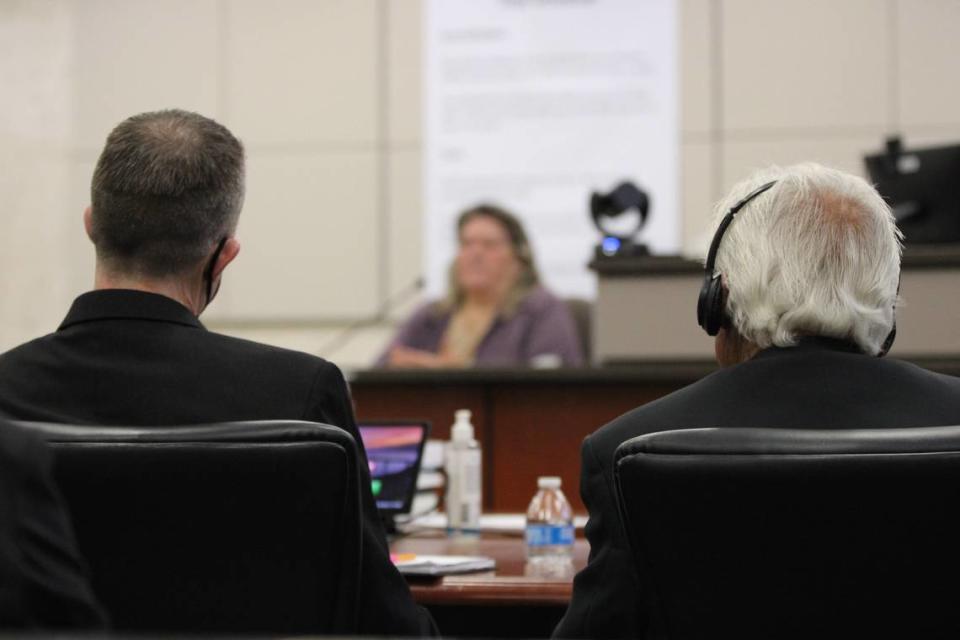
The state standard in 1996 was to have dogs cross-trained in finding both people who are alive and human remains, Morris testified, while today’s standard is to only have dogs to specialize in one.
The new standard was created by members of the California Rescue Dog Association, or CARDA, and California Office of Emergency Services. CARDA is a nonprofit group that trains and certifies various types of search dogs to help law enforcement agencies.
Sanger reiterated that both Cholla and Cirque were trained to find both live people and human remains. Morris repeated this was the standard at the time, and though both dogs were cross-trained, they primarily only searched for human remains.
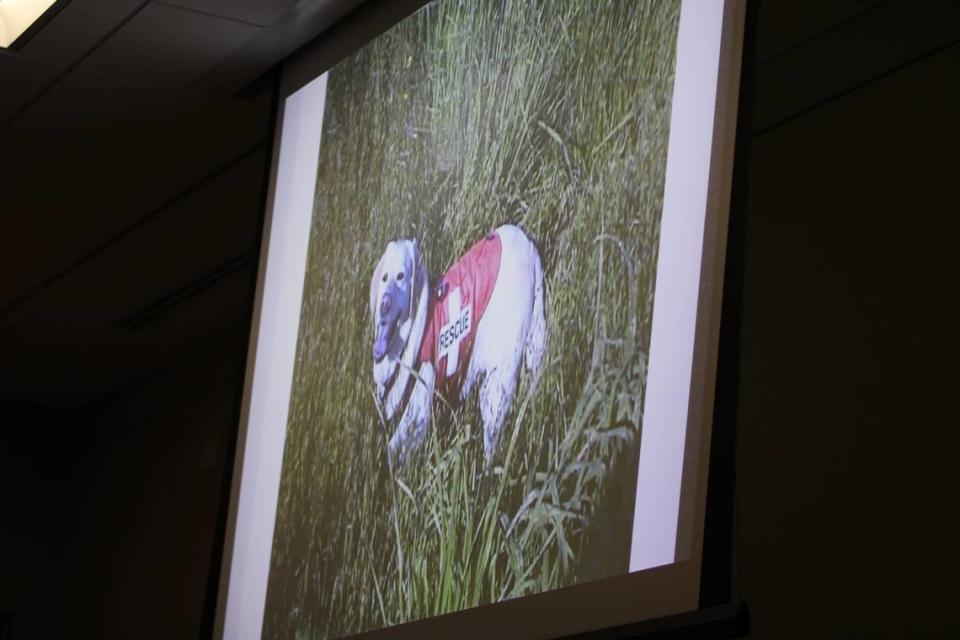
The certification process, especially for human remains detection, is arduous for good reason, Morris said.
If a dog does not accurately alert in their certification tests, they “are done,” Morris testified.
Sanger alleged that Morris did not accurately fill out her search log in 1996 because she had talked to Wayne Behrens, another dog handler who searched Cal Poly, and emailed a mentor a question before filling out her log.
Morris reiterated that though she had talked about the search with Behrens as they carpooled home and asked a mentor a question, the search log only pertained to what she did and what she observed her dog doing.
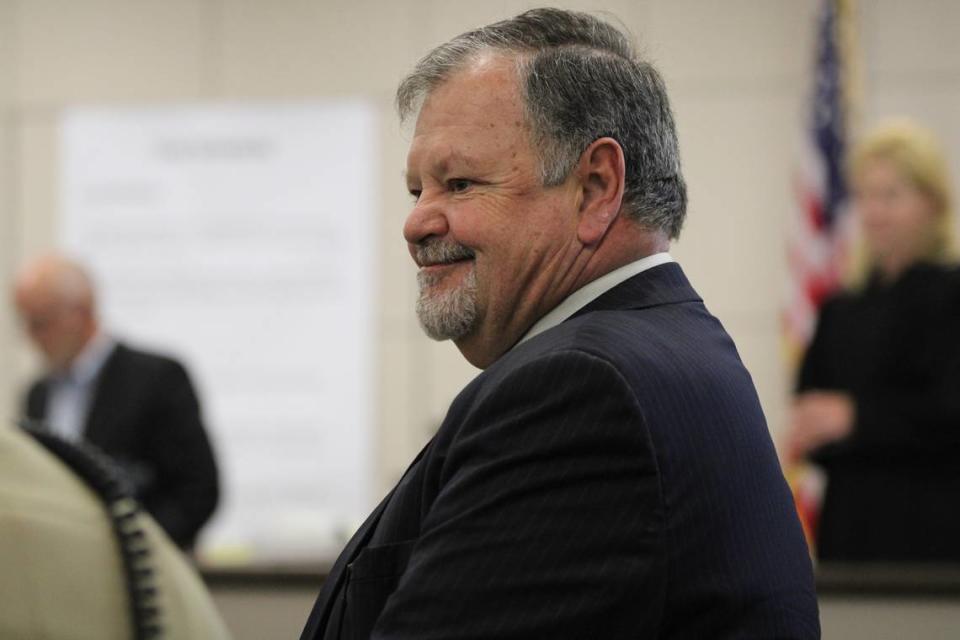
Mesick’s line of questioning on Tuesday focused on how Morris could interpret her dog’s behavior, specifically when they are searching for human remains, NBC News Dateline reported.
“You speak dog language, correct?” Mesick asked.
Peuvrelle objected, and Mesick rephrased the question to ask whether her dog’s behavior is subject to Morris’ interpretation of her dog’s behavior.
“I specialize in reading my dogs behavior and have trained them for a specific scent and I recognize when they have a change of behavior to find the scent,” Morris replied.
She said her dogs were interested in the Performing Arts Center, which was under construction at the time, but did not show “typical human remains scent” behaviors, such as heavy breathing or intensely smelling.
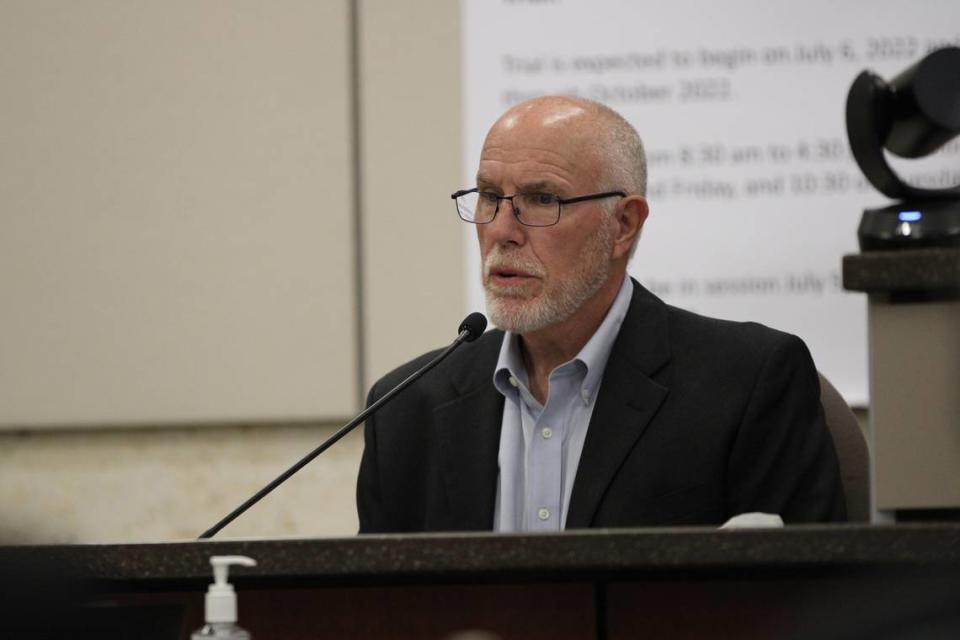
Handler: Third dog alert was ‘clear and unambiguous’
Behrens testified Tuesday that he and Morris carpooled to Cal Poly from the Bay Area, NBC News Dateline reported.
Morris’ two dogs and Behrens’ dog, Sierra, were in the back seat, he said.
Behrens said Sierra was trained to be a certified in human remains detection in two to three years, and officially certified about three weeks before the Cal Poly search on June 29, 1996. He now has more than 30 years of experience in human remains detection dog handling, he said.
Sierra was the first dog to alert to human remains in Flores’ dorm room, Behrens said.
Sierra was searching the perimeter of Santa Lucia Hall when she put her paws up on a window on the first floor — a clear indication that the dog wanted to get closer to the source of the scent through the window, Behrens said.
Behrens said he suggested searching inside the dorm, adding that he had no prior knowledge of specific areas of suspicion there.
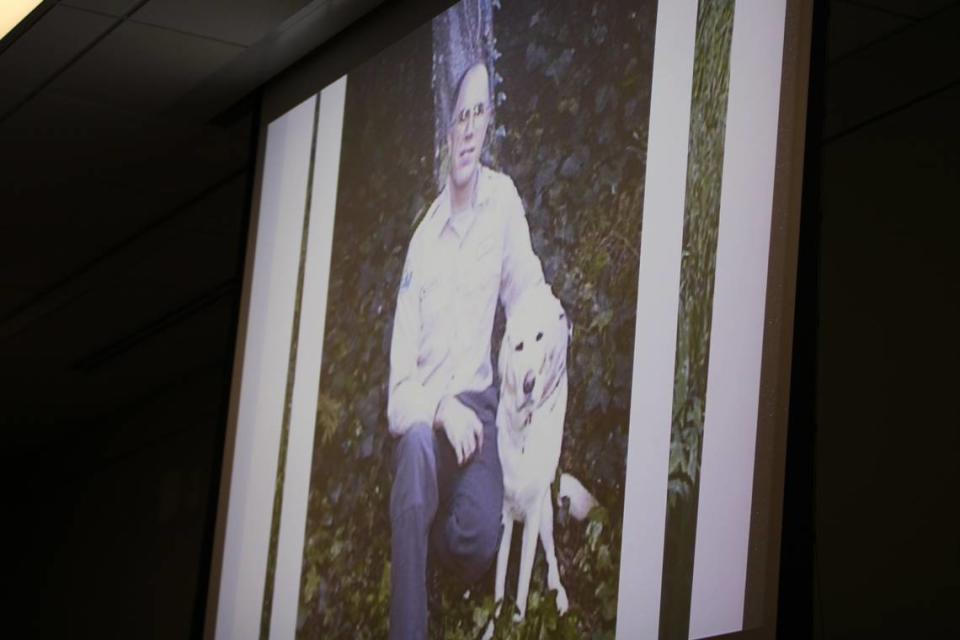
Sierra indicated she wanted to go into room 128 — Flores’ dorm — and, when let inside, alerted to the left side of the room, Behrens said.
The alert was “clear and unambiguous,” he added.
The dog also jumped on the mattress on the left side of the room, the handler said, but there was not a specific area she alerted to on the mattress.
Behrens suggested having other dogs confirm the results of the search, he said, and Sierra did not alert to anything else on campus.
“Did I find any human remains in the room? No,” Behrens said. “She just jumped up on the mattress.”
“I can tell you based on my 30 years of experience what I think the dog is responding to,” he added, meaning the scent of human remains.
Sanger’s cross examination of Behrens will continue when court resumes on Wednesday, Aug. 24.

